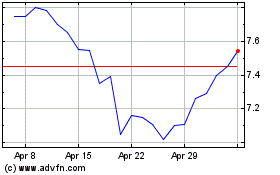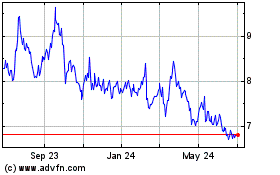By Sean McLain
This article is being republished as part of our daily
reproduction of WSJ.com articles that also appeared in the U.S.
print edition of The Wall Street Journal (November 27, 2018).
TOKYO -- Nissan Motor Co.'s chief executive told employees
Carlos Ghosn had too much power as chairman, highlighting the
tension that was welling up between the two men before Mr. Ghosn's
arrest a week ago.
The fallout from the arrest spread Monday as the former Nissan
chairman, who was ousted last week, was dropped from the same
position at alliance partner Mitsubishi Motors Corp.
Nissan CEO Hiroto Saikawa was long seen as a close ally of Mr.
Ghosn, but since the arrest Mr. Saikawa has painted a dark picture
of the Brazilian-born executive's reign, saying he was improperly
given the lion's share of credit for Nissan's revival in the 2000s
instead of the Japanese auto maker's rank-and-file.
On Monday, Mr. Saikawa addressed employees for the first time
since the arrest and said it was a problem that Nissan executives
often communicated with their counterparts at Renault SA through
Mr. Ghosn. The French company, which is also part of the auto
alliance, is headed by Mr. Ghosn.
Now that Mr. Ghosn is gone from Nissan's management, executives
can communicate directly, which will better "ensure autonomy," Mr.
Saikawa said, according to a partial transcript reviewed by The
Wall Street Journal.
Mr. Saikawa didn't touch on the details of the accusations
against Mr. Ghosn or propose specific revisions to Nissan's
alliance with Renault, said a person who listened to the
discussion.
A Renault spokesman declined to comment.
Prosecutors say they suspect Mr. Ghosn understated his
compensation by a total of about Yen5 billion, or $44 million, in
five years of Nissan financial reports to regulators through 2015.
Separately, a Nissan investigation alleges Mr. Ghosn used money
from a company fund intended for startups to have Nissan purchase
homes for his personal use in Rio de Janeiro and Beirut, according
to a person familiar with that investigation.
Mr. Ghosn has been jailed since his arrest and can't be reached
for comment.
Colleagues of Mr. Ghosn who were questioned by Nissan told the
investigators that the 64-year-old executive believed he was acting
appropriately when he didn't report millions of dollars in deferred
compensation, people familiar with Nissan's investigation said.
The Ghosn family believed the residences in Rio de Janeiro,
Beirut and other locations were corporate housing whose purchase
went through the normal channels for Nissan approval, a person
familiar with the family has said.
Japanese public broadcaster NHK reported Mr. Ghosn, who hasn't
been charged with a crime, has denied the allegations. A person
familiar with the matter said former Japanese prosecutor Motonari
Otsuru is representing Mr. Ghosn. Mr. Otsuru's office declined to
comment.
Mr. Ghosn also has hired U.S.-based law firm Paul, Weiss,
Rifkind, Wharton & Garrison LLP, this person said. Brad Karp,
the firm's chairman and a defense attorney for major Wall Street
banks, will represent Mr. Ghosn along with another of the firm's
partners, Michael E. Gertzman, the person said.
On Sunday, France's finance and economy minister, Bruno Le
Maire, said Renault had launched an internal audit to look into Mr.
Ghosn's remuneration and his use of company assets. On Monday, a
Renault official said the audit was being run by Claude Baland,
formerly general director of French police and now in charge of
ethics and compliance at the French car maker.
The arrest of Mr. Ghosn has jolted the three-way alliance of
Renault, Nissan and Mitsubishi that he forged. The board of
Mitsubishi, which is 34%-owned by Nissan, voted unanimously Monday
to strip Mr. Ghosn of the chairmanship and named Mitsubishi CEO
Osamu Masuko to the post for now.
Mr. Saikawa has said his immediate focus is making sure the
revelations don't hamper Nissan's operations. Nissan is working to
raise prices in the U.S., which is proving difficult amid slowing
sales in that market.
A priority for Mr. Saikawa is the relationship between Renault
and Nissan. Renault currently holds a 43.4% stake in Nissan, while
Nissan owns 15% of Renault. The imbalance is the legacy of the
circumstances under which the alliance was created. At the time
Renault was the healthier car maker, whereas now Nissan is the
bigger and more profitable of the two. The French government is
also a key player in the alliance because it holds a stake of just
over 15% in Renault.
In 2015, the two companies revised their relationship when the
French government sought to enforce recently granted double-voting
rights for "long-term" shareholders in French companies. Mr.
Saikawa led Nissan's side in the talks. Ultimately, they agreed to
limit the circumstances in which the French government could
exercise double-voting rights in Renault, and Nissan gained the
right to increase its stake in Renault if the government violated
the agreement.
At the time, Mr. Saikawa called it "deterrence" and said: "We've
been an equal partner based on mutual trust. But at the core, there
were parts where we were not equal partners."
--Nick Kostov contributed to this article.
Write to Sean McLain at sean.mclain@wsj.com
(END) Dow Jones Newswires
November 27, 2018 02:47 ET (07:47 GMT)
Copyright (c) 2018 Dow Jones & Company, Inc.
Nissan Motor (PK) (USOTC:NSANY)
Historical Stock Chart
From Jul 2024 to Aug 2024

Nissan Motor (PK) (USOTC:NSANY)
Historical Stock Chart
From Aug 2023 to Aug 2024
